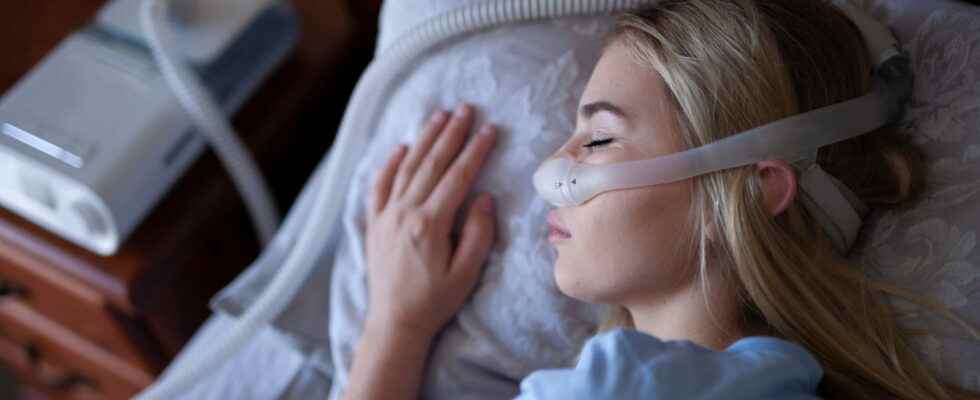The Medicines Agency warns of a risk of interference between certain masks for sleep apnea and implanted metal medical devices (pacemaker, etc.). These could malfunction. List of models concerned, dangers, precautions to be taken.
Attentionthere would be a risk of interference between certain masks for sleep apnea Philips (masks with magnet) and metal implanted medical devices such as pacemakers (pacemakers), warns the Medicines Agency (ANSM) in a press release dated November 2, 2022. These interferences can cause a dysfunction of the implanted medical device. 14 cases have been reported worldwide, mostly in the United States. As of September 19, 2022, one case had been reported in France by the manufacturer, without consequences for the patient. What are the affected models by this risk? What dangers ? What precautions to take? Path to follow.
What is the danger with these devices?
The Philips company indicates that interference may occur when patients or a member of their household wears metal implanted devices and are likely to be in close proximity to these masks containing magnets (at a distance of less than 15 cm). Interference can cause a dysfunction of these implanted devices. The ANSM recalls that in general, any device with a magnet is likely to cause interference with devices containing metals.
Which masks with magnets are affected by this risk?
The masks concerned are the following Philips brand models:
- Facial mask Amara View minimal contact
- Facial mask DreamWear
- Nasal mask DreamWisp with cushion on the nose
- Nasal masks Wisp and Wisp Youth
- Treatment mask 3100 NC/SP
► View the complete list of the references concerned
With which medical devices is there a risk?

- Pacemakers (pacemakers)
- Cardioverter defibrillators implantable (INN)
- Neurostimulators
- Metal and magnetic implants/electrodes/valves placed in upper limbs, torso or higher (i.e. neck and head)
- CSF (cerebrospinal fluid) shunts (e.g. ventriculoperitoneal shunt)
- Aneurysm clips
- Embolization Coils
- Intracranial Aneurysm Intravascular Flow Interruption Devices
- Metal skull plates, screws, burr hole protectors and bone substitutes
- Metallic chips in the eye
- Eye implants (eg, glaucoma implants, retinal implants)
- Certain contact lenses containing metal
- Implants to restore hearing or balance that contain an implanted magnet (such as cochlear implants, bone conduction implanted hearing devices, and brainstem hearing implants)
- Magnetic Denture Fixing Systems
- Metal gastrointestinal clips
- Metal stents (eg, aneurysm, coronary, tracheobronchial, biliary)
- Implantable ports and pumps (e.g. insulin pumps)
- Hypoglossal neurostimulators
- Devices labeled “Not suitable for MRI” (magnetic resonance imaging)
- Metallic and magnetic implants that do not have an MRI-related label or whose safety in a magnetic field has not been evaluated
What if you use a mask with magnet?
→ If I or someone in my household does not have a metal implanted devicementioned above: I am not affected by this contraindication, I can therefore continue to use my mask with magnets ; the ANSM recalls that in general, the risk of interference with any metallic device, implanted or not, can be ruled out beyond 15 cm.
→ If I have, or someone in my household has a metal implanted device mentioned above:
• I contact quickly my doctor to take advice and my home health provider (PSAD) so that it proceeds replacing my mask by a new magnetless mask.
• Pending replacement, we advise you not to immediately stop using your mask aloving yourself, without talking to your doctor about it.
• We recall that in general, the risk of interference with a metallic device, implanted or not, can be ruled out beyond 15 cm.
For patients with metal implantable devices and using masks with magnets, Philips requires that the masks are replaced as soon as possible by masks without magnets. The ANSM asks home healthcare providers to keep all the patients under their care and who use the masks in question informed of this news. Manufacturers other than Philips are also able to supply this type of mask.
Source : Safety information: Masks with Philips magnets for ventilation devices against sleep apnea, ANSM, November 2, 2022
